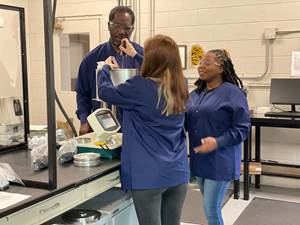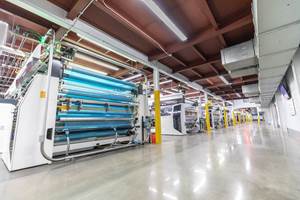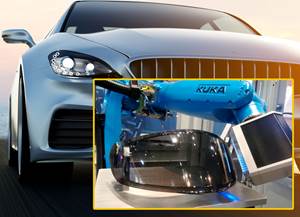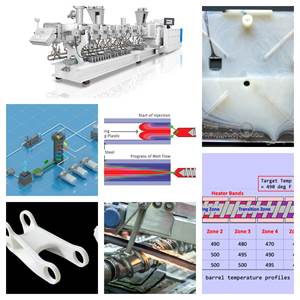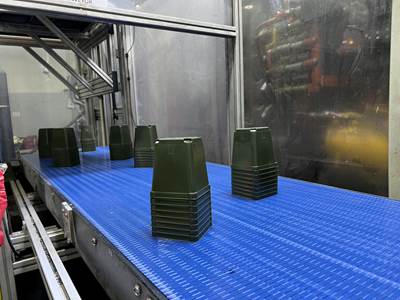PLA for Large-Format Additive Manufacturing
NatureWorks’ new Ingeo 3D700 shown to provide significant reduction in warping, minimizing print failures.
A PLA biopolymer specially designed for large format additive manufacturing that boasts a significant reduction in warping that minimizes print failures is newly available from NatureWorks, Minnetonka, Minn. Moreover,Ingeo 3D700 has been evaluated by multiple global ‘industry partners’ for use in large-format fused filament fabrication (FFF) in the form of a monofilament, and direct resin-to-print processes in the form of resin pellets with positive results. This has included a shrink rate less than 0.25% in printed parts and obtainable lower print temperatures due to optimized melt viscosity and microstructure.
In large-format printing, the higher rate and volume of polymer deposition can quickly result in excessive warpage with materials such as ABS, or significant shrinkage as with some polyolefins or even some general-purpose PLA grades. This can result in failed prints as warping pulls the part away from the print bed or causes layer separation. With the longer print times and higher-volume material use in industrial applications, failure during production is costly. By controlling the polymer-microstructure, the resulting amorphous PLA grade, Ingeo 3D700, has a low material shrink rate which is critical for reducing warpage, improving gap fill and adhesion, and ensuring successful prints.
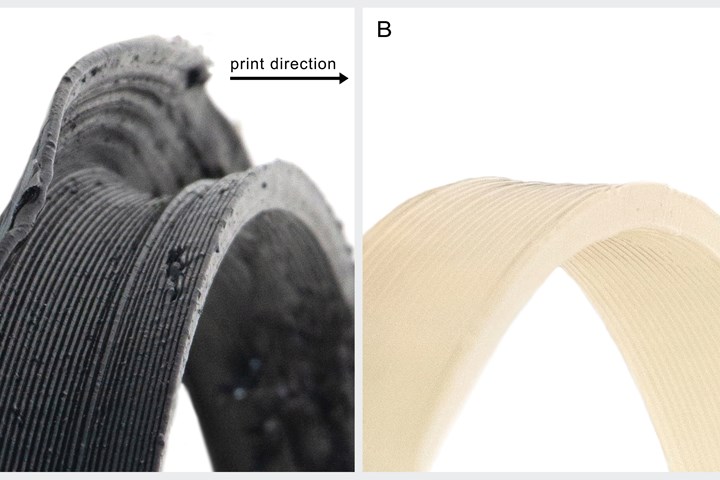
Notable warping with PP. left. New Ingeo grade for the same part on right.
Said NatureWorks’ business development leader Dan Sawyer, “As the 3D printing space expands into larger, more complex applications, we are seeing an increased need for printing materials that are tailored for a specific application or process. With significant growth in large-format additive manufacturing for industrial applications, we saw the opportunity to develop a new Ingeo biopolymer grade specifically designed to minimize the loss of time and material due to failures in large format prints.”
A common approach for minimizing part warpage in large prints is to use compounded materials with reinforcement such as mineral fillers, glass, carbon, or cellulosic fiber. Because Ingeo 3D700 has been designed for low shrinkage, there is an opportunity to use less reinforcing product and still achieve quality large-format parts, while maintaining the reliable printability of Ingeo PLA. If a specialty print requires additional reinforcement, then cellulose-based additives are easily compounded with Ingeo 3D700 creating a biobased compound alternative to high-cost petrochemical-based compounds such as carbon-fiber ABS.
Said Xiaofan Luo, president at Polymaker, a leading manufacturer of 3D printing material and filament, “In our testing, we found that Ingeo 3D700 goes one step further towards reducing warpage in large-format prints beyond previous Ingeo PLA grades designed for 3D printing.” In addition to lower shrinkage, Polymaker also measured improved z-layer adhesion when printing with Ingeo 3D700.
Dyze Design, an extruder designer and supplier of components for large-format printers, ran print tests comparing Ingeo 3D850, a grade already known for its low-shrink characteristics, and new Ingeo 3D700. Said Dyze CTO Philippe Carrier, “Our tests showed that a large-format part printed using Ingeo 3D850 demonstrated a shrink rate of 1.25%. In comparison, the same part printed with Ingeo 3D700 had a shrink rate of less than 0.25%. Because Ingeo 3D700 also has a higher throughput rate, we were able to successfully print at the lower temperature of 190 C (374 F) without seeing shrinkage or warping in the part.”
Filament manufacturer MCPP conducted printing tests using filament made from Ingeo 3D700 and demonstrated a 11-13% increase in flow rate due to the optimized melt viscosity, compared to a general-purpose PLA. According to MCPP, “this resulted in improved gap fill and adhesion between perimeter layers. Therefore, it is also expected to be suitable for FGF (fused granular fabrication) 3D printing.”
The new Ingeo 3D700 grade is already finding use in metal casting manufacturing. Using a direct resin-to-print process, Shanghai TuoZhuo is printing sand casting molds that can be as tall as 1-2 meters. The 3D printed molds are replacing traditional wood foundry molds because they are faster to produce, more cost efficient, and easier to maintain as wood molds warp over time due to moisture. Said Gabino Chen, project manager at Shanghai TuoZhuo New Materials Technology Co., Ltd. “There is no warping or deformation when printing with an amorphous PLA grade like Ingeo 3D700. Using ABS, PETG, or PA in prints of this size is difficult, which is why it’s important to use PLA and useful to have a PLA grade specifically designed for large format printing.”
Related Content
SD Polymers: 'One-Stop Solution for Mechanical Recycling'
‘Passionate’ recycler invests in people and technology to meet commitment to innovative, sustainable solutions for its processor customers.
Read MoreMinnesota-Based Initiative Launches Circular Economy for Flexible Films in Upper Midwest
MBOLD coalition unites leading global businesses and research institutions to catalyze a regional circular economy for flexible films and packaging materials.
Read MoreAdvanced Hardcoat Technologies for Automotive
Momentive’s SilFort technology geared to auto exterior applications.
Read MorePlastics Technology’s Most-Viewed Articles from 2022
Tips, new technologies, resin pricing, best practices and more piqued reader interest at Plastics Technology in 2022.
Read MoreRead Next
Processor Turns to AI to Help Keep Machines Humming
At captive processor McConkey, a new generation of artificial intelligence models, highlighted by ChatGPT, is helping it wade through the shortage of skilled labor and keep its production lines churning out good parts.
Read MoreLead the Conversation, Change the Conversation
Coverage of single-use plastics can be both misleading and demoralizing. Here are 10 tips for changing the perception of the plastics industry at your company and in your community.
Read MoreAdvanced Recycling: Beyond Pyrolysis
Consumer-product brand owners increasingly see advanced chemical recycling as a necessary complement to mechanical recycling if they are to meet ambitious goals for a circular economy in the next decade. Dozens of technology providers are developing new technologies to overcome the limitations of existing pyrolysis methods and to commercialize various alternative approaches to chemical recycling of plastics.
Read More









.png;maxWidth=300;quality=90)








